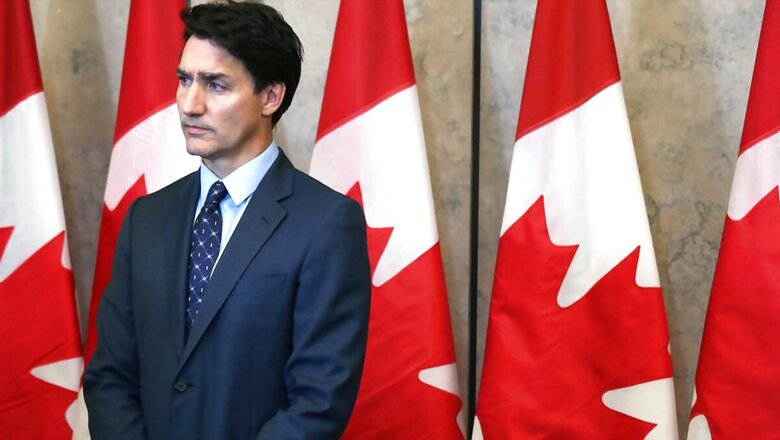
views
‘Juvenile’ Trudeau acknowledged yesterday that he had not provided India with evidence to substantiate the allegations he made, linking ‘Indian agents’ to the killing of Khalistani terrorist Hardeep Singh Nijjar on Canadian soil. While testifying before the Public Inquiry into Foreign Interference in Federal Electoral Processes and Democratic Institutions in Ottawa, he admitted that what he gave India “was primarily intelligence, not hard evidentiary proof.” He also stated, “Some South Asian MPs were insistent that it was likely connected to India,” though he did not name those MPs.
Trudeau said, “I was briefed on the fact that there was intelligence from Canada, and possibly from Five Eyes allies, that made it fairly clear, incredibly clear, that India was involved in this… Agents of the government of India were involved in the killing of a Canadian on Canadian soil.”
After Trudeau’s deposition at the Commission of Inquiry, India’s Ministry of External Affairs issued a post-midnight statement, saying, “What we have heard today only confirms what we have been saying consistently all along – Canada has presented us (India) with no evidence whatsoever in support of the serious allegations it has chosen to level against India and Indian diplomats.”
It is unfortunate that Trudeau’s immature and shortsighted policies have plunged the cordial relationship between India and Canada to a new low. While in the past, some disagreements caused strains in bilateral ties, never before has this level of open confrontation been witnessed. As things stand, the relationship seems poised to deteriorate further, with the bitterness likely to intensify — all because Trudeau, in his juvenile and immature approach, failed to recognise that such serious allegations must be substantiated with evidence.
Three questions arise — firstly, why did this crisis erupt in Indo-Canadian relations? Secondly, what has been the fallout on the grounds of Trudeau’s policy towards India? Thirdly, can anything be done to prevent the crisis from becoming even more damaging?
The crisis erupted because Justin Trudeau has been indulging in vote bank politics, allowing a wide range of anti-India activities to be carried out by Khalistan supporters. Sikhs constitute 2.1 per cent of Canada’s population, and Trudeau desperately needs their votes. The Khalistan supporters are aggressive and wield significant influence within the Sikh community.
Trudeau’s reliance on pro-Khalistan elements became evident after the federal elections held in September 2021. The Canadian Parliament has 338 seats, and Justin Trudeau’s Liberal Party won 160 seats, falling short of the 170 needed for a majority. Thus, Trudeau required outside support to form a government, which he secured from Jagmeet Singh Dhaliwal, leader of the New Democratic Party (NDP), which holds 25 seats.
Jagmeet Singh Dhaliwal is an anti-India, pro-Khalistan activist. In 2013, India denied him a visa due to his demands for a “separate homeland for Sikhs.” He was accused by the then Indian government of harbouring an “insidious agenda aimed at disturbing India’s social fabric and undermining its peace, harmony, and territorial integrity.” By providing outside support, Jagmeet Singh was able to influence Trudeau’s policies towards India.
On September 4, 2024, Jagmeet Singh Dhaliwal withdrew his support from Justin Trudeau. However, his party voted against two no-confidence motions tabled by the Conservative Party on September 25 and October 2, respectively. This clearly demonstrated that Jagmeet Singh wanted Trudeau’s government to continue, as it was advantageous for his pro-Khalistan activities.
This brings us to the second question—what has been the fallout of Trudeau’s policy? The consequences have been deeply unfortunate. His Cabinet has included individuals openly associated with an extremist and separatist agenda regarding India. The actions of pro-Khalistan elements have not only strained India-Canada relations but have also fostered a climate of violence and criminality in Canada, to the detriment of its own citizens. Canada has become a hub for anti-India activities orchestrated by extremist Sikhs.
Regrettably, pro-Khalistan activists have been able to carry out their anti-India agenda unchecked, largely due to the support they receive from Trudeau. For example, on June 4 last year, radical Sikhs organised a parade in Brampton glorifying the assassination of Indira Gandhi. The parade featured a tableau of Indira Gandhi with bloodstains on her clothes and a poster that read: “Revenge Of Attack On Shri Darbar Sahib.”
These extremist Sikhs openly call for the breakup of India and the creation of Khalistan. They have attacked the Indian High Commission in Ottawa and displayed posters inciting the assassination of Indian diplomats, including the Indian High Commissioner in Canada. They have also issued threats against the Hindu community in Canada.
India had repeatedly raised this issue with Canada, but to no avail. On April 28 this year, pro-Khalistan slogans were chanted at an event in Toronto, which was attended by Prime Minister Justin Trudeau. The slogan-chanting at the gathering was ‘disturbing’ and highlighted the ongoing atmosphere of anti-India ‘separatism, extremism, and violence’ within Canada’s political space, taking place right under Trudeau’s nose.
In September 2023, Indo-Canadian relations began to nosedive like never before. Trudeau claimed that Canadian intelligence agencies were “pursuing credible allegations of a potential link” between Indian government agents and the assassination of Hardeep Singh Nijjar. He repeated this allegation on several occasions. However, despite multiple requests from the Government of India, the Trudeau government did not provide a shred of evidence. This left little doubt that, under the guise of an investigation, Trudeau was pursuing a deliberate strategy of smearing India for political gains.
A few days ago, on October 13, 2024, the Canadian government sent a diplomatic communication to India, suggesting that the Indian High Commissioner and other diplomats were ‘persons of interest’ in the investigation into Nijjar’s murder. Canada absurdly demanded that India lift the diplomatic immunity of the High Commissioner and other diplomats. Once again, Canada made allegations without providing any substantiated evidence.
The Indian government strongly rejected these preposterous imputations and attributed them to the political agenda of the Trudeau government, which is centred around vote bank politics. The government decided to withdraw the High Commissioner and other targeted diplomats and officials. It also expelled six Canadian diplomats, including the Acting High Commissioner and the Deputy High Commissioner.
The third and final question is this: Can anything be done to prevent the crisis from escalating further? As long as Justin Trudeau remains Prime Minister, there is little chance of any improvement in Indo-Canadian relations. A relationship takes years to build, but it can be destroyed in a jiffy—and ‘Juvenile’ Trudeau has done just that. Canadians must vote him out and bring in a new leader, for unless they do, the downward spiral in relations is likely to continue. If a new government takes office in Canada, diplomatic dialogue can be initiated to restore trust and normalcy.
The writer is a retired Indian diplomat and had previously served as Consul General in New York. Views expressed in the above piece are personal and solely those of the author. They do not necessarily reflect News18’s views.



















Comments
0 comment